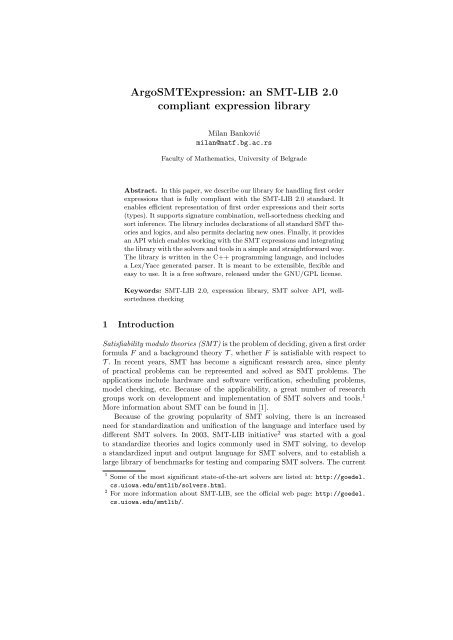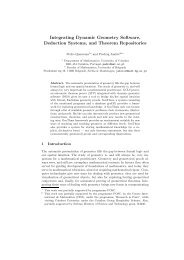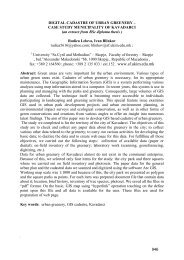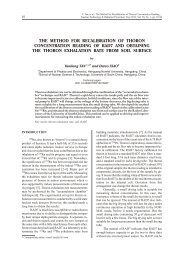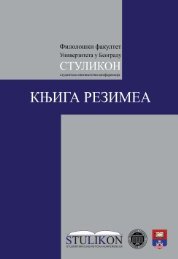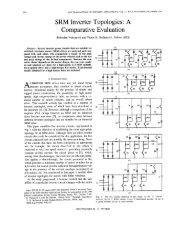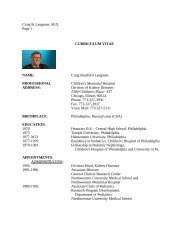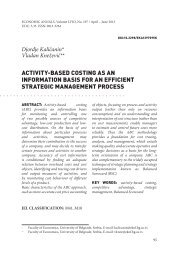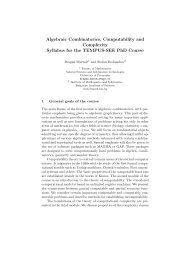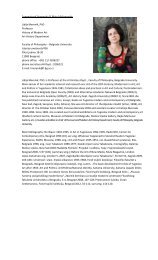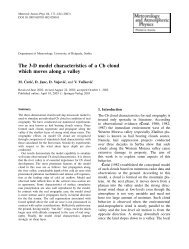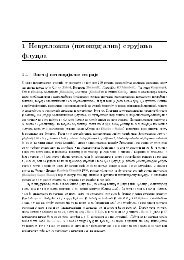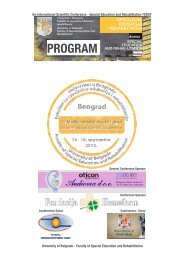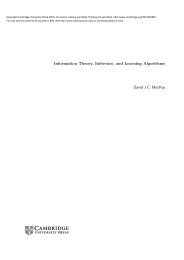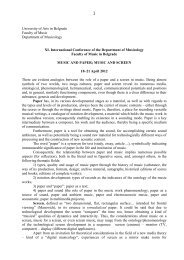ArgoSMTExpression: an SMT-LIB 2.0 compliant expression library
ArgoSMTExpression: an SMT-LIB 2.0 compliant expression library
ArgoSMTExpression: an SMT-LIB 2.0 compliant expression library
Create successful ePaper yourself
Turn your PDF publications into a flip-book with our unique Google optimized e-Paper software.
<strong>Argo<strong>SMT</strong>Expression</strong>: <strong>an</strong> <strong>SMT</strong>-<strong>LIB</strong> <strong>2.0</strong><br />
compli<strong>an</strong>t <strong>expression</strong> <strong>library</strong><br />
Mil<strong>an</strong> B<strong>an</strong>ković<br />
mil<strong>an</strong>@matf.bg.ac.rs<br />
Faculty of Mathematics, University of Belgrade<br />
Abstract. In this paper, we describe our <strong>library</strong> for h<strong>an</strong>dling first order<br />
<strong>expression</strong>s that is fully compli<strong>an</strong>t with the <strong>SMT</strong>-<strong>LIB</strong> <strong>2.0</strong> st<strong>an</strong>dard. It<br />
enables efficient representation of first order <strong>expression</strong>s <strong>an</strong>d their sorts<br />
(types). It supports signature combination, well-sortedness checking <strong>an</strong>d<br />
sort inference. The <strong>library</strong> includes declarations of all st<strong>an</strong>dard <strong>SMT</strong> theories<br />
<strong>an</strong>d logics, <strong>an</strong>d also permits declaring new ones. Finally, it provides<br />
<strong>an</strong> API which enables working with the <strong>SMT</strong> <strong>expression</strong>s <strong>an</strong>d integrating<br />
the <strong>library</strong> with the solvers <strong>an</strong>d tools in a simple <strong>an</strong>d straightforward way.<br />
The <strong>library</strong> is written in the C++ programming l<strong>an</strong>guage, <strong>an</strong>d includes<br />
a Lex/Yacc generated parser. It is me<strong>an</strong>t to be extensible, flexible <strong>an</strong>d<br />
easy to use. It is a free software, released under the GNU/GPL license.<br />
Keywords: <strong>SMT</strong>-<strong>LIB</strong> <strong>2.0</strong>, <strong>expression</strong> <strong>library</strong>, <strong>SMT</strong> solver API, wellsortedness<br />
checking<br />
1 Introduction<br />
Satisfiability modulo theories (<strong>SMT</strong>) is the problem of deciding, given a first order<br />
formula F <strong>an</strong>d a background theory T , whether F is satisfiable with respect to<br />
T . In recent years, <strong>SMT</strong> has become a signific<strong>an</strong>t research area, since plenty<br />
of practical problems c<strong>an</strong> be represented <strong>an</strong>d solved as <strong>SMT</strong> problems. The<br />
applications include hardware <strong>an</strong>d software verification, scheduling problems,<br />
model checking, etc. Because of the applicability, a great number of research<br />
groups work on development <strong>an</strong>d implementation of <strong>SMT</strong> solvers <strong>an</strong>d tools. 1<br />
More information about <strong>SMT</strong> c<strong>an</strong> be found in [1].<br />
Because of the growing popularity of <strong>SMT</strong> solving, there is <strong>an</strong> increased<br />
need for st<strong>an</strong>dardization <strong>an</strong>d unification of the l<strong>an</strong>guage <strong>an</strong>d interface used by<br />
different <strong>SMT</strong> solvers. In 2003, <strong>SMT</strong>-<strong>LIB</strong> initiative 2 was started with a goal<br />
to st<strong>an</strong>dardize theories <strong>an</strong>d logics commonly used in <strong>SMT</strong> solving, to develop<br />
a st<strong>an</strong>dardized input <strong>an</strong>d output l<strong>an</strong>guage for <strong>SMT</strong> solvers, <strong>an</strong>d to establish a<br />
large <strong>library</strong> of benchmarks for testing <strong>an</strong>d comparing <strong>SMT</strong> solvers. The current<br />
1 Some of the most signific<strong>an</strong>t state-of-the-art solvers are listed at: http://goedel.<br />
cs.uiowa.edu/smtlib/solvers.html.<br />
2 For more information about <strong>SMT</strong>-<strong>LIB</strong>, see the official web page: http://goedel.<br />
cs.uiowa.edu/smtlib/.
version <strong>2.0</strong> ([2]) of the st<strong>an</strong>dard was released in 2010, <strong>an</strong>d currently most of the<br />
leading <strong>SMT</strong> solvers are in the process of adopting the new st<strong>an</strong>dard.<br />
One of the first issues in developing <strong>an</strong> <strong>SMT</strong> solver is to implement efficient<br />
representation of first order <strong>expression</strong>s used by the solver. Since this part of<br />
the solver is the closest to the user input, it is also the part that is the most<br />
dependent on the input l<strong>an</strong>guage, specifications of used theories, <strong>an</strong>d other features<br />
required by the st<strong>an</strong>dard. In this paper, we describe a C++ <strong>library</strong> for<br />
representing first order <strong>expression</strong>s, compli<strong>an</strong>t with the <strong>SMT</strong>-<strong>LIB</strong> <strong>2.0</strong> st<strong>an</strong>dard.<br />
Its most prominent features include: efficient implementation of <strong>expression</strong>s <strong>an</strong>d<br />
their sorts, full well-sortedness checking, sort inference, signature combining <strong>an</strong>d<br />
exp<strong>an</strong>ding, simple way to define new theories <strong>an</strong>d logics, <strong>an</strong>d st<strong>an</strong>dard-compli<strong>an</strong>t<br />
application programming interface (API), accomp<strong>an</strong>ied with a Lex/Yacc generated<br />
parser. The <strong>library</strong> is designed in a multi-layered fashion, permitting different<br />
ways of use, from low level operation, giving the user full control <strong>an</strong>d<br />
flexibility, to high level API driven operation, in which case using the <strong>library</strong><br />
is simple <strong>an</strong>d straightforward. The <strong>library</strong> is developed in a way that permits<br />
extensions <strong>an</strong>d new features, as the st<strong>an</strong>dard itself evolves in the future. Finally,<br />
the <strong>library</strong> is a free software, <strong>an</strong>d the author hopes that it will be a good starting<br />
point for other researchers who w<strong>an</strong>t to develop new tools <strong>an</strong>d solvers.<br />
Motivation. Historically, each <strong>SMT</strong> solver has developed its own input l<strong>an</strong>guage<br />
<strong>an</strong>d its own <strong>expression</strong> <strong>library</strong>. These l<strong>an</strong>guages <strong>an</strong>d libraries in different solvers<br />
are quite similar, but still incompatible. This has raised m<strong>an</strong>y issues, regarding<br />
the cooperation within the <strong>SMT</strong> community. Some of these issues were resolved<br />
when <strong>SMT</strong>-<strong>LIB</strong> was introduced, but some of them still remain:<br />
– <strong>expression</strong> libraries in existing <strong>SMT</strong> solvers typically do not support all the<br />
features required by <strong>SMT</strong>-<strong>LIB</strong> st<strong>an</strong>dard. Thus, st<strong>an</strong>dardization of the input<br />
l<strong>an</strong>guage alone does not me<strong>an</strong> much, since simple tr<strong>an</strong>slation from <strong>SMT</strong>-<br />
<strong>LIB</strong> st<strong>an</strong>dard input to solver specific representation is not always possible,<br />
without loss of information.<br />
– intermixing codebases of different <strong>SMT</strong> solvers is not possible, since their representations<br />
of <strong>expression</strong>s are incompatible. For inst<strong>an</strong>ce, using the same<br />
implementation of some theory decision procedure with different <strong>SMT</strong> solvers<br />
is impossible without special adapters that tr<strong>an</strong>sform between different <strong>expression</strong><br />
representations.<br />
– developing a new <strong>SMT</strong> solver requires implementing the <strong>expression</strong> <strong>library</strong><br />
from scratch, since there is no st<strong>an</strong>dard <strong>SMT</strong> <strong>expression</strong> <strong>library</strong> (contrary<br />
to m<strong>an</strong>y other areas of computer programming, where providing a st<strong>an</strong>dard<br />
implementation of common software parts is considered as a natural step).<br />
– developing other tools that depend on <strong>SMT</strong> solvers as backends c<strong>an</strong> be a<br />
tedious work, if a tool should be able to work with different <strong>SMT</strong> solvers. In<br />
that case, if a tool generates <strong>an</strong> <strong>SMT</strong> formula to be solved, it must support<br />
exporting the formula to different <strong>expression</strong> implementations, since it must<br />
be able to communicate with the API’s of different solvers.<br />
A natural solution to all these issues is adoption of one st<strong>an</strong>dard <strong>expression</strong><br />
<strong>library</strong>, compli<strong>an</strong>t with the <strong>SMT</strong>-<strong>LIB</strong> st<strong>an</strong>dard. So, in the authors opinion, the
st<strong>an</strong>dard itself is just one step in achieving the goals of the <strong>SMT</strong>-<strong>LIB</strong> initiative<br />
– the st<strong>an</strong>dard <strong>expression</strong> <strong>library</strong> is what would enable full cooperation within<br />
the <strong>SMT</strong> community.<br />
Related work. As far as we know, there is no open source <strong>SMT</strong> <strong>expression</strong><br />
<strong>library</strong> that implements all the features of the current <strong>SMT</strong>-<strong>LIB</strong> st<strong>an</strong>dard.<br />
Open<strong>SMT</strong> ([3]) solver includes <strong>an</strong> open source implementation of <strong>expression</strong>s,<br />
but still does not fully support the st<strong>an</strong>dard. Other related work include several<br />
tools that act as parsers <strong>an</strong>d tr<strong>an</strong>slators to other solver specific representations,<br />
but these tools do not include <strong>expression</strong> libraries. There is a Java <strong>SMT</strong>-<strong>LIB</strong><br />
<strong>2.0</strong> compli<strong>an</strong>t suite of tools ([4]) that acts as a front-end to several different<br />
(non-conforming) <strong>SMT</strong> solvers. An open-source C99 parser ([5]) also exists, <strong>an</strong>d<br />
it provides <strong>an</strong> abstract interface that enables integration with <strong>an</strong> <strong>SMT</strong> solver.<br />
There are also parsers available in Haskell ([6]) <strong>an</strong>d Ocaml ([7]) l<strong>an</strong>guages.<br />
2 The <strong>library</strong> description<br />
In this section we provide a description of the <strong>library</strong>. We adopt notation, concepts<br />
<strong>an</strong>d definitions from [2]. Due to the lack of space, no usage examples are<br />
provided in the text. Detailed documentation <strong>an</strong>d usage examples (along with<br />
the source code of the <strong>library</strong> itself) are available at the project’s web page:<br />
http://www.matf.bg.ac.rs/~mil<strong>an</strong>/software/argosmte/.<br />
2.1 Low level: signatures, <strong>expression</strong>s <strong>an</strong>d sorts<br />
Basic types. The <strong>library</strong> provides classes that represent basic lexical <strong>an</strong>d syntactical<br />
elements defined by the st<strong>an</strong>dard ([2]) (symbols, keywords, identifiers,<br />
variables, etc.). All these basic types are internally represented as strings. The<br />
attribute type is defined as a (keyword, value) pair. Attribute value is represented<br />
by <strong>an</strong> abstract class that c<strong>an</strong> contain virtually <strong>an</strong>y kind of data. This<br />
enables versatile usage of attributes during the solving process (not just for<br />
purposes currently defined by the st<strong>an</strong>dard).<br />
Expressions. Expressions (or terms in <strong>SMT</strong>-<strong>LIB</strong>’s terminology, [2]) are represented<br />
using the common sub<strong>expression</strong> sharing technique. Expressions are<br />
maintained within the <strong>expression</strong> factory, which is responsible for creation <strong>an</strong>d<br />
destruction of the <strong>expression</strong>s. Each <strong>expression</strong> is represented by a unique <strong>expression</strong><br />
node. The factory keeps all created <strong>expression</strong> nodes in a hash table,<br />
<strong>an</strong>d returns a shared pointer to a node, when requested. Common sub<strong>expression</strong>s<br />
are shared between different nodes – each node keeps only shared pointers<br />
to its subnodes, which saves the memory. Shared pointers are used as h<strong>an</strong>dles<br />
for m<strong>an</strong>ipulating the <strong>expression</strong>s in the factory. Expressions are equipped with a<br />
rich interface that allows convenient work with them (extracting sub<strong>expression</strong>s,<br />
free variables, exp<strong>an</strong>ding definitions, etc.).<br />
Sorts. Since sorts in <strong>SMT</strong>-<strong>LIB</strong> <strong>2.0</strong> c<strong>an</strong> have term-like structure ([2]), they are<br />
represented in the similar way as the <strong>expression</strong>s. All sort nodes are created <strong>an</strong>d<br />
maintained within the sort factory, <strong>an</strong>d a shared pointer is returned to the user
as a h<strong>an</strong>dle for the created sort. As for the <strong>expression</strong>s, a similar interface is<br />
provided for convenient work with sorts.<br />
Signatures. The purpose of the Signature class is to hold the information<br />
about declared sort symbols, function symbols <strong>an</strong>d special const<strong>an</strong>ts (or special<br />
const<strong>an</strong>t types, e.g. NUMERALs). Different forms of declarations are permitted –<br />
from simple declarations (for inst<strong>an</strong>ce, when function symbol is declared with<br />
given r<strong>an</strong>k <strong>an</strong>d attributes), to complex abstract declarations (for inst<strong>an</strong>ce, when<br />
function symbols are declared in a free form l<strong>an</strong>guage, with complex constraints).<br />
In the latter case, the user c<strong>an</strong> add <strong>an</strong> abstract checker that c<strong>an</strong> accept arbitrary<br />
user-defined symbols <strong>an</strong>d check the symbols against arbitrary constraints.<br />
Signature hierarchy. Notice that <strong>SMT</strong>-<strong>LIB</strong> <strong>2.0</strong> st<strong>an</strong>dard ([2]) defines two different<br />
types of relations between signatures: exp<strong>an</strong>sion <strong>an</strong>d combination. Exp<strong>an</strong>sion<br />
me<strong>an</strong>s that one signature contains other signature. Combination me<strong>an</strong>s the<br />
union of two or more signatures. Our <strong>library</strong> supports both types of relations.<br />
Combination is typically used in logic declarations, when signatures of different<br />
theories are combined into one logic’s signature. Exp<strong>an</strong>sion is useful when the<br />
user w<strong>an</strong>ts to temporarily add some symbols to the signature, <strong>an</strong>d then remove<br />
them when they are out of scope (for inst<strong>an</strong>ce, when push <strong>an</strong>d pop API comm<strong>an</strong>ds<br />
are invoked, [2]). In that case, one c<strong>an</strong> attach a signature exp<strong>an</strong>sion to the<br />
existing signature, <strong>an</strong>d add these temporary symbols to that exp<strong>an</strong>sion. When<br />
exp<strong>an</strong>sion is not needed <strong>an</strong>y more, it is simply destroyed.<br />
Well-sortedness. After a signature is created, <strong>an</strong> <strong>expression</strong> factory c<strong>an</strong> be<br />
created over the signature. When <strong>expression</strong>s (sorts) are created, <strong>expression</strong><br />
(sort) factory consults the signature to check for function (sort) symbols or<br />
special const<strong>an</strong>ts. This well-sortedness checking c<strong>an</strong> be turned off, for efficiency.<br />
During the well-sortedness checking, sort inference is performed – each <strong>expression</strong><br />
is assigned a sort, retrieved from the corresponding r<strong>an</strong>k of the top function<br />
symbol. If well-sortedness checking is turned off, no sort inference is performed<br />
<strong>an</strong>d sorts of all <strong>expression</strong>s are set to undefined (except in case when the sort is<br />
explicitly given, for inst<strong>an</strong>ce by as clause, [2]). In that case, sort inference c<strong>an</strong><br />
be explicitly invoked later, if needed.<br />
2.2 Intermediate level: theory <strong>an</strong>d logic declarations<br />
When the <strong>library</strong> is used at the low level, one must m<strong>an</strong>ually create <strong>an</strong>d populate<br />
signatures with appropriate sort <strong>an</strong>d function symbols. This gives power <strong>an</strong>d<br />
flexibility (especially when custom theories <strong>an</strong>d logics are declared), but c<strong>an</strong> be<br />
troublesome <strong>an</strong>d error-prone. Easier way is to define a signature for some theory<br />
or logic once, <strong>an</strong>d then create <strong>an</strong> inst<strong>an</strong>ce of it when needed. Abstract classes<br />
TheoryDeclaration <strong>an</strong>d LogicDeclaration act like virtual constructors – their<br />
subclasses should define one virtual method createSignature that creates <strong>an</strong>d<br />
populates <strong>an</strong> appropriate signature <strong>an</strong>d returns a pointer to it. The <strong>library</strong> includes<br />
such subclasses for each st<strong>an</strong>dard <strong>SMT</strong>-<strong>LIB</strong> <strong>2.0</strong> theory <strong>an</strong>d logic. In order<br />
to create the signature of some st<strong>an</strong>dard theory or logic, <strong>an</strong> inst<strong>an</strong>ce to appropriate<br />
subclass should be created (for inst<strong>an</strong>ce, IntsTheoryDeclaration for Ints
theory), <strong>an</strong>d its createSignature method should be invoked. The signature is<br />
then created <strong>an</strong>d ready to use.<br />
2.3 High level: <strong>SMT</strong>-<strong>LIB</strong> <strong>2.0</strong> API<br />
The current st<strong>an</strong>dard of <strong>SMT</strong>-<strong>LIB</strong> ([2]) defines scripts as a sequence of comm<strong>an</strong>ds.<br />
The set of allowed comm<strong>an</strong>ds <strong>an</strong>d their syntax <strong>an</strong>d sem<strong>an</strong>tics is also<br />
defined by the st<strong>an</strong>dard. In general, comm<strong>an</strong>ds are dedicated to the <strong>SMT</strong> solver<br />
which should respond to them by appropriate action. However, while certain<br />
comm<strong>an</strong>ds are dependent on the solver, m<strong>an</strong>y comm<strong>an</strong>ds do not involve <strong>an</strong>y<br />
actual <strong>SMT</strong> solving for their execution. For inst<strong>an</strong>ce, comm<strong>an</strong>ds check-sat,<br />
get-unsat-core, get-values <strong>an</strong>d get-assignment require that the <strong>SMT</strong> solver<br />
first checks for satisfiability of the current set of all assertions ([2]). On the other<br />
side, comm<strong>an</strong>ds declare-sort, declare-fun, push <strong>an</strong>d pop just affect the current<br />
signature, <strong>an</strong>d do not require <strong>an</strong>y solving (the same is with comm<strong>an</strong>ds<br />
set-option, set-info, get-option <strong>an</strong>d get-info). Our idea is to separate <strong>an</strong>d<br />
fully implement the comm<strong>an</strong>ds that do not need the solver for their execution,<br />
<strong>an</strong>d provide the st<strong>an</strong>dard interface to the solver for those comm<strong>an</strong>ds that require<br />
actual solving. The class <strong>SMT</strong>LibAPI provides API for all comm<strong>an</strong>ds defined by<br />
the st<strong>an</strong>dard. The class includes internal database of logic declarations that c<strong>an</strong><br />
be activated by the set-logic comm<strong>an</strong>d ([2]). All st<strong>an</strong>dard logic declarations<br />
are included by default, <strong>an</strong>d new ones c<strong>an</strong> be easily registered. When set-logic<br />
comm<strong>an</strong>d is invoked, the corresponding LogicDeclaration inst<strong>an</strong>ce creates the<br />
signature for that logic. It also creates <strong>an</strong> <strong>expression</strong> factory over that signature.<br />
After that, sorts <strong>an</strong>d <strong>expression</strong>s c<strong>an</strong> be created in a usual fashion.<br />
Assertions. The class <strong>SMT</strong>LibAPI also implements the assertion set stack ([2]).<br />
When the push comm<strong>an</strong>d ([2]) is invoked, a new assertion set is initialized <strong>an</strong>d<br />
pushed to the assertion set stack, <strong>an</strong>d also a new exp<strong>an</strong>sion signature is attached<br />
to the current signature <strong>an</strong>d pushed to the signature stack. All sort <strong>an</strong>d function<br />
symbols declared <strong>an</strong>d defined subsequently are added to that exp<strong>an</strong>sion signature.<br />
All <strong>expression</strong> subsequently asserted are added to the current assertion<br />
set. When the pop comm<strong>an</strong>d ([2]) is invoked, the current assertion set is poped<br />
from the assertion set stack, <strong>an</strong>d the top exp<strong>an</strong>sion signature is poped from the<br />
signature stack <strong>an</strong>d destroyed, together with all symbols declared in it.<br />
Symbol definitions. Function <strong>an</strong>d sort symbol definitions are also supported.<br />
When comm<strong>an</strong>ds define-sort or define-fun ([2]) are invoked, the corresponding<br />
symbol is added to the top exp<strong>an</strong>sion signature, <strong>an</strong>d the symbol’s definition<br />
is attached to it as a value of :definition attribute. Symbol definitions are<br />
used in sort <strong>an</strong>d <strong>expression</strong> exp<strong>an</strong>sion, also fully implemented in the <strong>library</strong>.<br />
Communication with the solver. The state of the <strong>SMT</strong>LibAPI class inst<strong>an</strong>ce<br />
c<strong>an</strong> be easily read by the <strong>SMT</strong> solver, using the interface of the class. For those<br />
API comm<strong>an</strong>ds that depend on the <strong>SMT</strong> solver, the <strong>library</strong> provides <strong>an</strong> abstract<br />
class SolverInterface that should implement virtual methods checkSat,<br />
getValue, getProof, <strong>an</strong>d so on. The <strong>library</strong> user should define a subclass of<br />
this class that should either implement the <strong>SMT</strong> solver itself, or implement <strong>an</strong><br />
adapter to the <strong>SMT</strong> solver’s code. The inst<strong>an</strong>ce of that subclass is then assigned
to the <strong>SMT</strong>LibAPI inst<strong>an</strong>ce, <strong>an</strong>d further operation c<strong>an</strong> be driven completely using<br />
the interface provided by the <strong>SMT</strong>LibAPI class. Comm<strong>an</strong>ds that require <strong>SMT</strong><br />
solver are then just delegated to the solver through the SolverInterface class.<br />
Parser. The class <strong>SMT</strong>LibAPI also includes the method parseInput that implements<br />
a Lex/Yacc generated parser. Therefore, instead of invoking the comm<strong>an</strong>ds<br />
programmatically (through API), the <strong>library</strong> c<strong>an</strong> parse <strong>an</strong> input file with<br />
some <strong>SMT</strong>-<strong>LIB</strong> <strong>2.0</strong> script.<br />
3 Conclusions <strong>an</strong>d Further Work<br />
In this paper, we have described a free <strong>an</strong>d open source C++ program <strong>library</strong><br />
that implements first order <strong>expression</strong>s, compli<strong>an</strong>t with the <strong>SMT</strong>-<strong>LIB</strong> <strong>2.0</strong> st<strong>an</strong>dard.<br />
It enables easy development of conforming tools <strong>an</strong>d solvers, <strong>an</strong>d provides<br />
different ways to work with <strong>expression</strong>s, from low level m<strong>an</strong>ipulation, to high<br />
level API driven operation. It is developed in a way that permits further extensions,<br />
as the st<strong>an</strong>dard itself evolves. Contrary to the existing libraries <strong>an</strong>d<br />
utilities, our <strong>library</strong> fully implements first order <strong>expression</strong>s – it is not just <strong>an</strong><br />
<strong>SMT</strong>-<strong>LIB</strong> <strong>2.0</strong> parser <strong>an</strong>d syntax checker that works as a wrapper or <strong>an</strong> interface<br />
to existing <strong>SMT</strong> solvers.<br />
The author tried to make the <strong>library</strong> as complete as possible, but is quite<br />
sure that some features might be missing. Efficiency improvements <strong>an</strong>d profiling<br />
may also be required, in order to prepare the <strong>library</strong> for production use. Further<br />
work also includes ensuring thread-safety, to enable the usage of the <strong>library</strong> in<br />
a multi-threaded environment.<br />
Acknowledgements. This work was partially supported by the Serbi<strong>an</strong> Ministry<br />
of Science gr<strong>an</strong>t 174021 <strong>an</strong>d by the SNF gr<strong>an</strong>t SCOPES IZ73Z0 127979/1. The<br />
author is grateful to Filip Marić for very careful reading of the text <strong>an</strong>d providing<br />
detailed <strong>an</strong>d useful comments <strong>an</strong>d remarks.<br />
References<br />
1. Barrett, C., Sebasti<strong>an</strong>i, R., Seshia, S.A., Tinelli, C.: Satisfiability Modulo Theories.<br />
In: H<strong>an</strong>dbook of Satisfiability. IOS Press (2009) 825–885<br />
2. Barrett, C., Stamp, A., Tinelli, C.: The <strong>SMT</strong>-<strong>LIB</strong> st<strong>an</strong>dard: Version <strong>2.0</strong>. (2010)<br />
3. Bruttomesso, R., Pek, E., Sharygina, N., Tsitovich, A.: The Open<strong>SMT</strong> Solver.<br />
In: International Conference on Tools <strong>an</strong>d Algorithms for the Construction <strong>an</strong>d<br />
Analysis of Systems (TACAS). Volume 6015., Paphos, Cyprus, Springer, Springer<br />
(2010) 150–153<br />
4. Cok, D.R.: The j<strong>SMT</strong><strong>LIB</strong> User Guide. http://www.grammatech.com/resources/<br />
smt/j<strong>SMT</strong><strong>LIB</strong>UserGuide.pdf (2011)<br />
5. Griggio, A.: A Generic Parser for <strong>SMT</strong>-<strong>LIB</strong> v2. https://es.fbk.eu/people/<br />
griggio/misc/smtlib2parser.html (2011)<br />
6. Hawkins, T.: A <strong>library</strong> for reading <strong>an</strong>d writing <strong>SMT</strong>-<strong>LIB</strong> 2 scripts via Haskell.<br />
http://hackage.haskell.org/package/smt-lib (2010)<br />
7. Krchak, K., Stump, A.: OCaml lexer <strong>an</strong>d parser for <strong>SMT</strong> <strong>2.0</strong> scripts. http://www.<br />
cs.uiowa.edu/~astump/software/ocaml-smt2.zip (2010)


